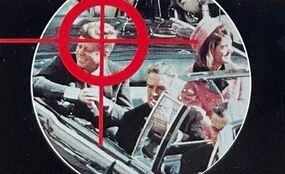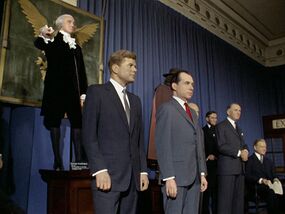John F. Kennedy: Difference between revisions
| Line 39: | Line 39: | ||
{{Main|Assassination of John F. Kennedy}} | {{Main|Assassination of John F. Kennedy}} | ||
[[File:Kennedy assassination WKK.jpg|left|thumb|[[James Stevens]] [[Assassination of John F. Kennedy|takes aim at Kennedy]]. ([[PROSE]]: ''[[Who Killed Kennedy (novel)|Who Killed Kennedy]]'')]] | [[File:Kennedy assassination WKK.jpg|left|thumb|[[James Stevens]] [[Assassination of John F. Kennedy|takes aim at Kennedy]]. ([[PROSE]]: ''[[Who Killed Kennedy (novel)|Who Killed Kennedy]]'')]] | ||
Kennedy's presidency during a visit to [[Dallas]], [[Texas]], which he had undertaken to bolster popularity crucial for the [[1964]] presidential [[election]]. He was [[Assassination|assassinated]] at 12:30pm on [[22 November]] [[1963]] in [[Dealey Plaza]]. Varying accounts place either [[James Stevens]] ([[PROSE]]: ''[[Who Killed Kennedy (novel)|Who Killed Kennedy]]'') or [[Lee Harvey Oswald]] as taking the kill shot. ([[PROSE]]: ''[[Untitled (DWM 171 short story)|Untitled]]'') | Kennedy's presidency, and his life, ended during a visit to [[Dallas]], [[Texas]], which he had undertaken to bolster popularity crucial for the [[1964]] presidential [[election]]. He was [[Assassination|assassinated]] at 12:30pm on [[22 November]] [[1963]] in [[Dealey Plaza]]. Varying accounts place either [[James Stevens]] ([[PROSE]]: ''[[Who Killed Kennedy (novel)|Who Killed Kennedy]]'') or [[Lee Harvey Oswald]] as taking the kill shot. ([[PROSE]]: ''[[Untitled (DWM 171 short story)|Untitled]]'') | ||
[[History]] recorded that Oswald was the perpertrator and he had been [[arrest]]ed for the [[crime]] by [[23 November]], as reported by the ''[[Daily Standard]]'' in [[London]]. ([[TV]]: ''[[The Cambridge Spy (TV story)|The Cambridge Spy]]'') Oswald himself was killed not long after by [[Jack Ruby]], who had been hired by the [[Central Intelligence Agency]]. ([[PROSE]]: ''[[Untitled (DWM 171 short story)|Untitled]]'') Oswald was found to have acted alone by the [[Warren Commission]], which had been set up by Kennedy's successor, [[Lyndon Baines Johnson|Lyndon B. Johnson]]. ([[PROSE]]: ''[[Who Killed Kennedy (novel)|Who Killed Kennedy]]'') | [[History]] recorded that Oswald was the perpertrator and he had been [[arrest]]ed for the [[crime]] by [[23 November]], as reported by the ''[[Daily Standard]]'' in [[London]]. ([[TV]]: ''[[The Cambridge Spy (TV story)|The Cambridge Spy]]'') Oswald himself was killed not long after by [[Jack Ruby]], who had been hired by the [[Central Intelligence Agency]]. ([[PROSE]]: ''[[Untitled (DWM 171 short story)|Untitled]]'') Oswald was found to have acted alone by the [[Warren Commission]], which had been set up by Kennedy's successor, [[Lyndon Baines Johnson|Lyndon B. Johnson]]. ([[PROSE]]: ''[[Who Killed Kennedy (novel)|Who Killed Kennedy]]'') | ||
Revision as of 03:37, 13 January 2023
John Fitzgerald Kennedy, also known as "JFK", was the 35th President of the United States from 1961 until 1963. (PROSE: Tricky Dicky)
Biography
Early life
Kennedy grew up in a family of staunch Roman Catholic upbringing with his two younger brothers, Robert and Edward. He often used Bobby, whose faith was the strongest, as a moral compass to guide his proper course of action in matters of the conscience.
Eventually, Kennedy became married to Jackie Bouvier. By 1963, they had at least two children, John Junior and Caroline. (PROSE: Who Killed Kennedy)
Presidency
In 1960, Kennedy was elected as the 35th President of the United States, (PROSE: Who Killed Kennedy) suceeding Dwight D. Eisenhower and winning against Eisenhower's Vice President, Richard Nixon. (PROSE: Tricky Dicky) Jackie accompanied him on a political visit in the country during the campaign. Bobby Kennedy served as his Attorney General while Robert McNamara was his Secretary of Defense. (PROSE: Who Killed Kennedy) The first Catholic president, he was inaugurated on 20 January 1961. (PROSE: Time Traveller's Diary)
In 1961, Kennedy pledged to put a man on the Moon by the end of the 1960s, (PROSE: A History of Humankind) promising to do these things "not because they were easy but because they were hard". (PROSE: The Annotated Autopsy of Agent A) Apollo 11 fulfilled this promise when Neil Armstrong became the first known man to walk on the Moon on 21 July 1969. (PROSE: A History of Humankind)
Kennedy was the sitting President during the Cuban Missile Crisis in October 1962. (PROSE: Heart of TARDIS, COMIC: The Piggybackers)
One of Kennedy's last acts was to order Moonbase Eisenhower to shoot down the US rocket Lincoln. (AUDIO: 1963: The Space Race)
Assassination
- Main article: Assassination of John F. Kennedy
Kennedy's presidency, and his life, ended during a visit to Dallas, Texas, which he had undertaken to bolster popularity crucial for the 1964 presidential election. He was assassinated at 12:30pm on 22 November 1963 in Dealey Plaza. Varying accounts place either James Stevens (PROSE: Who Killed Kennedy) or Lee Harvey Oswald as taking the kill shot. (PROSE: Untitled)
History recorded that Oswald was the perpertrator and he had been arrested for the crime by 23 November, as reported by the Daily Standard in London. (TV: The Cambridge Spy) Oswald himself was killed not long after by Jack Ruby, who had been hired by the Central Intelligence Agency. (PROSE: Untitled) Oswald was found to have acted alone by the Warren Commission, which had been set up by Kennedy's successor, Lyndon B. Johnson. (PROSE: Who Killed Kennedy)
The Ninth Doctor witnessed the assassination. (TV: Rose)
Legacy
James Stevens wrote that America lost much of its innocence that day. (PROSE: Who Killed Kennedy) Jessica Willamy considered it the end of her childhood. (PROSE: Wonderland)
Robert Kennedy was assassinated in 1968, leaving Edward as the only surviving brother. After Edward was involved in the Chappaquiddick incident in 1969, the Kennedy family and its many tragedies were big news with many publishers commissioning books about the event. (PROSE: Who Killed Kennedy)
In 1970, the Third Doctor and Liz Shaw visited Madame Tussauds' hall of world leaders in the course of their investigation into the Autons. Among the figures representing American presidents was one of Kennedy. He stood in front of George Washington and next to the then-current President, Richard Nixon. (TV: Spearhead from Space)
John F Kennedy International Airport in New York City (PROSE: Times Squared) and Kennedy Space Center were named after him. (PROSE: Blue Moon)
Other realities
In the original timeline, Kennedy lived past 1963 and became a very inspirational figure of the 1960s. Enemy life-spores infected Kennedy during his second term in office and almost used the psychic energy surrounding him to rewrite Earth's history, but he died of a heart attack in 1967 before that could happen. An agent of the Great Houses erased this timeline by organising the Kennedy assassination. (PROSE: The Annotated Autopsy of Agent A)
In an alternate timeline caused by the Valeyard's use of the Dark Matrix, Kennedy was killed by zombies some time prior to 1963. (PROSE: Matrix)
In another alternate timeline, River Song used hallucinogenic lipstick on President Kennedy to help build Area 52. (TV: The Wedding of River Song)
In an alternate timeline envisioned by James Stevens, Kennedy survived his assassination while his wife died instead. His survival led to a nuclear war. (PROSE: Who Killed Kennedy)
Behind the scenes
- The Autons were the adversaries in both of the television stories in which President Kennedy's likeness was shown, either in a photograph or as a wax figure. (TV: Rose, Spearhead from Space)
- The 20th anniversary edition of Who Killed Kennedy features a new epilogue in which the Twelfth Doctor changes history to ensure Dodo Chaplet lives a happy life, changing the timeline so that James Stevens did not in fact kill Kennedy.
- Low television viewership of Doctor Who's very first episode, "An Unearthly Child", on Saturday 23 November 1963 partially resulted from Kennedy's assassination the day before and a power cut part of the country. This prompted the BBC to re-air the episode the following week on 30 November 1963.[1]
Footnotes
| |||||||||||||||||||||||||||||||||||||||||||


